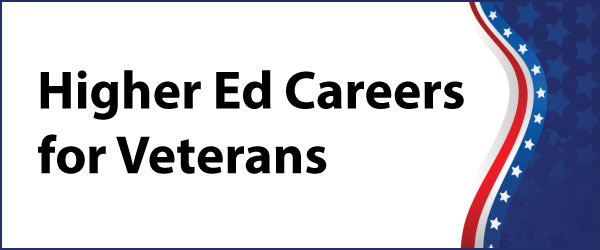Higher Ed Careers for Veterans: Human Resources IT
Are you exploring higher ed careers for veterans? Meet Tony Whack. He has served the past 19 years in the role of HRIS (Human Resources Information System) Manager at Wright State University.
What made you consider a career in higher education?
I did not specifically seek a career in higher education. While in the military, I had acquired certain skills in the IT field. A position became available as I was approaching the close of my military career and I was fortunate enough to be selected for it.
Did you run into any specific challenges as a veteran transitioning to higher ed and if so how did you manage it/them?
The primary challenge I experienced was adapting to the less-rigid workplace environment when compared to the military. I had to become much more flexible where enforcement of policies and procedures was concerned – “Don’t be so tough!”
Did anything surprise you about working in higher ed that you did not expect?
I found it difficult to understand how projects could not develop momentum to move forward to completion. Meeting for the sake of meeting, dragging things out, indecision
Tell us about your current role.
I am the HRIS Manager for the Human Resources department at Wright State University. I oversee the HR module of the university’s ERP system and other related HR IT software systems.
What are some of the benefits of working in higher education?
Depending on the institution, the workforce tends to be more formally educated. Working with individuals that are degree holders can be beneficial for everyone.
How do you think being a veteran has served you in this role?
As a career military person, I believe that the experience levels in supervision and management tend to be higher since many military personnel are required to serve in leadership roles at younger ages than one might experience in other workplaces and careers. Adaptability is another advantage that military personnel might have since they are constantly subject to changes in their career fields, locations, cultures, etc.
Did your military experience easily translate into a civilian occupation? If not, did you have to receive additional training and/or certifications?
With the exception of my IT skills, my military responsibilities and experiences were not related to education at all. My IT skills were something I developed to assist me with the administrative functions of my actual job. Once in higher ed, I did seek additional training and certifications related to IT functions. My supervision and management training did translate also.
What similarities are there (if any) between working in higher education and serving in the military?
The feeling of teamwork, comradery, and evolving challenges…all to serve a meaningful purpose that is The military is too broad of an environment to provide a general response. There are some career paths in the military that can translate to higher ed, and there are just as many that have no possible similarity at all. For me, the culture of teamwork, camaraderie and accountability requires that an individual exhibit the behavior that will uphold those values. That can translate to higher ed, and it does to some degree, but not at the levels that exist in the military.
Check out more resources for veterans exploring careers in higher ed.
About the Author: Sara Ermeti has worked in HR leadership for nearly 30 years in various industries such as higher education, NFP, Religious, Financial, Entertainment, and Transportation. She is also an adjunct professor teaching courses in HR and Business. Sara is a certified coach and resume writer offering individual and business consulting through Esperto HR Office.

